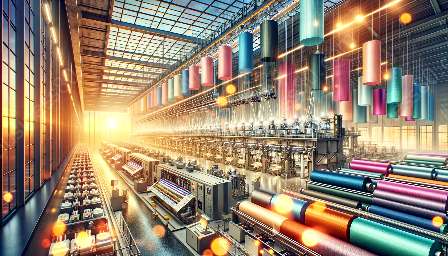The textile manufacturing industry plays a significant role in our lives, supplying the fabrics and materials we use for clothing, household items, and industrial applications. However, the traditional methods of textile production have been associated with significant environmental and social impacts, driving the need for sustainable practices in textile manufacturing.
The Impact of Traditional Textile Manufacturing
Traditional textile manufacturing processes rely heavily on non-renewable resources, such as petroleum-based synthetic fibers and chemicals that can have harmful effects on the environment. Additionally, the vast amount of water and energy required for production and the generation of industrial waste contribute to environmental degradation.
Beyond environmental concerns, the social implications of conventional textile manufacturing, including poor working conditions, low wages, and lack of safety standards, have raised ethical concerns in the industry.
Sustainable Textile Manufacturing: Eco-Friendly Materials
One of the key areas of focus in sustainable textile manufacturing is the use of eco-friendly materials. Organic cotton, hemp, bamboo, and recycled fibers are among the sustainable alternatives that have gained popularity in the industry. These materials are cultivated or processed using methods that minimize environmental impact and reduce dependence on harmful chemicals.
Furthermore, the development of bio-based materials, such as fibers derived from agricultural waste or microbial fermentation, presents innovative opportunities for sustainable textile production.
Cleaner Production Processes
Integrating cleaner production processes is essential in sustainable textile manufacturing. This involves implementing technologies and practices that reduce energy consumption, minimize water usage, and limit the emission of pollutants. The adoption of closed-loop systems for dyeing and finishing, as well as the use of renewable energy sources, contributes to a more sustainable and eco-efficient approach to textile manufacturing.
Additionally, advancements in water treatment and recycling technologies help minimize the impact of textile production on water resources, addressing one of the most pressing environmental concerns associated with the industry.
Innovations in Sustainable Textile Manufacturing
The rapid pace of technological innovation has led to the development of new processes and materials that offer significant potential for sustainable textile manufacturing. For example, the use of nanotechnology in fabric production can enhance the functional properties of textiles while reducing the environmental footprint of production processes.
Furthermore, the integration of digital design and manufacturing technologies, such as 3D knitting and additive manufacturing, enables the customization of textile products and minimizes material waste, leading to a more sustainable approach to production.
The Role of Sustainable Textile Manufacturing in Fashion
As consumer demand for sustainable and ethically produced fashion continues to rise, the role of sustainable textile manufacturing in the fashion industry becomes increasingly significant. Brands and manufacturers are under pressure to adopt environmentally friendly practices and transparent supply chains in response to consumer preferences for sustainable clothing and textiles.
Moreover, initiatives such as sustainable fashion weeks and certifications for eco-friendly textiles further promote the integration of sustainable practices in textile manufacturing, encouraging industry-wide change.
The Future of Sustainable Textile Manufacturing
Looking ahead, the future of sustainable textile manufacturing holds promise for continued innovation and transformation. Advancements in biotechnology, materials science, and circular economy principles are expected to drive the development of new sustainable materials and production processes in the textile industry.
Collaboration across the supply chain, from fiber producers to garment manufacturers, will be key to fostering a more sustainable and transparent industry. Embracing sustainable textile manufacturing not only contributes to environmental preservation but also supports the well-being of communities and workers involved in the textile value chain.

